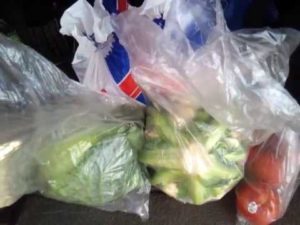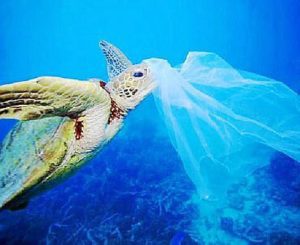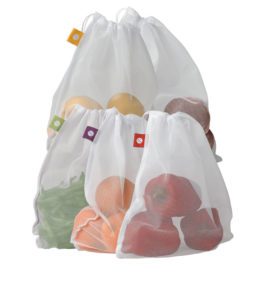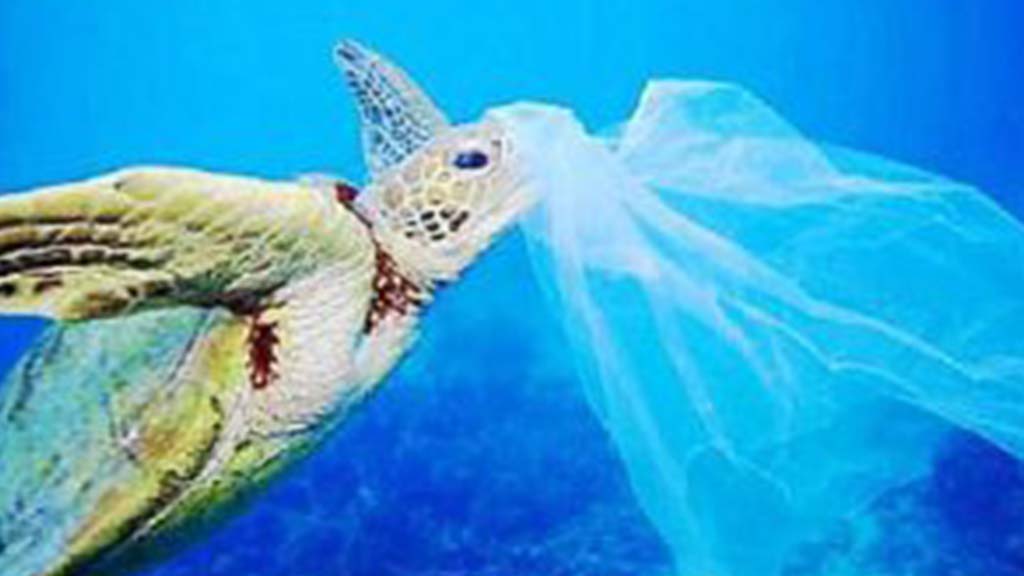By Shelley Abrams
Steve and I listened to a local NPR program the other day. They were talking about the use of plastic bags, specifically bags used when purchasing produce, and the impact on the economy and environment. It was interesting and stimulated a conversation between us about our rather large accumulation of empty produce bags and what to do about it.
First off, let me make this clear. We are not talking about plastic grocery bags. We are talking about the clear or yellow/green plastic bags most grocery stores provide for you toPlastic single sue produce bags place your produce in as you shop, presumably to separate your produce from other items you are purchasing, to keep the produce from touching the “germs” in the cart, to make it easier to weigh and to store once you get home.
Steve and I, like many Americans, believed we were being conscientious every time we went to the grocery store, bringing along our re-usable grocery bags to carry our items home. But probably like most Americans, we never gave putting our produce into plastic bags a second thought.


We live in Seattle where recycling is big. And like many cities, Seattle requires the use of re-usable shopping bags for your groceries unless you want to pay for a paper bag; plastic grocery bags aren’t allowed. Also like other cities, Seattle has a long list of items you need/are expected to recycle. Not only are you expected to recycle, you are also expected to put aside your food waste for composting. They even fine you if you are caught dumping too many recyclables or compostables in the garbage bin. In fact, they have only a few things they classify as garbage.
So where is this going?
Even with Seattle’s state-of-the-art recycling center and their strict recycling policies, there is still too much waste because there are things they DON’T accept as recyclable. Among them? Produce bags, plastic grocery bags, baggies and related plastic wrapping (“single-use” bags or wrapping). Nor do they accept things like an empty potato chip or dog food bag. But is this really wise? When Steve and I look at our outgoing garbage, I’d say close to 90% of our waste is some type of plastic bag or wrapping. And it makes us feel bad.
But it’s worse than just making us feel bad. Plastic bags are hurting our environment, and as it turns out, it also hurts our pocketbook and our health.
Seattle is not alone in their refusal to accept single-use bags for recycling. There are many reasons for not recycling these bags. The primary reason Seattle gives for not allowing us to recycle these items is that there may be residue from food particles (even if washed) so they can’t be properly recycled with the technology Seattle currently uses to eliminate potential contamination. I suspect, however, that the real reason is the same as it is in California, where only 3% of the approximate 13 to 20 billion bags are recycled. Plastic bags jam recycling equipment, causing equipment malfunctions or breakdowns and resulting repairs. They also frequently shut down recycling facilities so bags can be removed, increasing the manual cost of recycling. Ultimately, it just costs too much money to recycle these bags.
Instead, the bags go to landfills, or even worse, they escape from the landfills and end up in the streets, beaches, and waterways, causing well-documented and well-publicized sea turtle with plastic bagharm to our oceans and wildlife. It costs taxpayers – you and me – untold millions of dollars in clean-up efforts. It also hurts businesses that are dependent on our oceans and other waterways for their livelihoods. So I guess we’re damned if we do and damned if we don’t [recycle these bags]. It’s best to not use them in the first place.


As I mentioned earlier, it doesn’t just hurt our pocketbooks and our environment. It also harms our health. How? First off, plastic bags are derived from natural gas and petroleum products so when they finally break down, the toxins find their way into the soil which is washed into the waterways and eventually into the ocean. In the oceans, the plastic degrades and breaks off into mini smaller pieces known as microplastics. Microplastics make their way into the food chain; big fish eat smaller fish who eat even smaller organisms, all which have been exposed to plastic pollution. We buy big fish such as sea bass, salmon or tuna and ingest the microplastics, putting toxins directly in our bodies. Microplastics have also been found in sea salt, so when we salt our food using sea salt, we further harm our bodies.
So now back to produce bags specifically.
As I said before, even as conscientious and environmentally aware as Steve and try to be, we never gave plastic produce bags a second thought. It was just automatic to pull it off the reel for our fruit and veggies, that is until the NPR program brought the issue home.


The solution? We need to educate people to bring about more awareness and encourage people to adopt new behaviors. It took a lot of effort to get more Americans to begin using reusable cloth grocery bags and it will take the same for produce bags. But there are options out there right now. Steve and I, for one, are changing our habits immediately to include purchasing and using mesh or similar reusable produce bags.
What about you?
Let me know your thoughts in the comments below.

